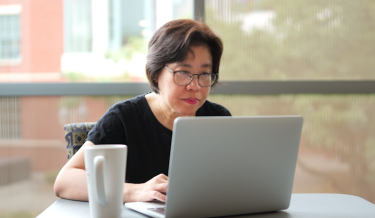Video by Sam Han | Text by Ignacio Lobos | UW-IT Communications & Engagement
 When Ka Yee Yeung, professor at the School of Engineering and Technology at UW Tacoma, was looking for computing power to ignite her lab work, she turned to UW-IT and the e-Science Institute for help.
When Ka Yee Yeung, professor at the School of Engineering and Technology at UW Tacoma, was looking for computing power to ignite her lab work, she turned to UW-IT and the e-Science Institute for help.
“Modern day biology is very much a data-rich science, and a lot of modern day technologies like sequencing technology, like microscopes and all of that, generate really large datasets,” she said.
So finding a way to work with so much data is essential to advancing the work of biomedical researchers. Her team partnered with UW-IT and e-Science Institute computing experts to find suitable cloud computing solutions and even cloud credits that make it less expensive for her graduate students to conduct their cloud computing work.
The collaboration has allowed Yeung and her lab to develop computationally optimized methods and software tools to make it easier for biologists and clinicians to analyze biomedical data.
In the past year, they have been working to develop a platform called the BioDepot Workflow Builder. The open source platform, funded by the National Institutes of Health, allows researchers to build bioinformatics workflows by combining interchangeable and encapsulated widgets. That process allows researchers to more easily implement and test new algorithms and observe how output differ.
“Our goal is to make it easier for our biologists and clinicians to interactively and reproducibly run their analytical workflows,” she said.
Reproducible analysis of data is a key part of the research process, particularly when big datasets are involved.
“A lot of the dataset we work with are what we call sequencing data, which looks at genetic variations across different people or patient samples. Reproducible analysis of data is very essential,” Yeung said.
With BioDepot, her team is working to address these issues, making research data reproducible — and making it easier for researchers to interact with the data without training in programing.
For more information and to hear Yeung talk about her work, watch this UW-IT video.
